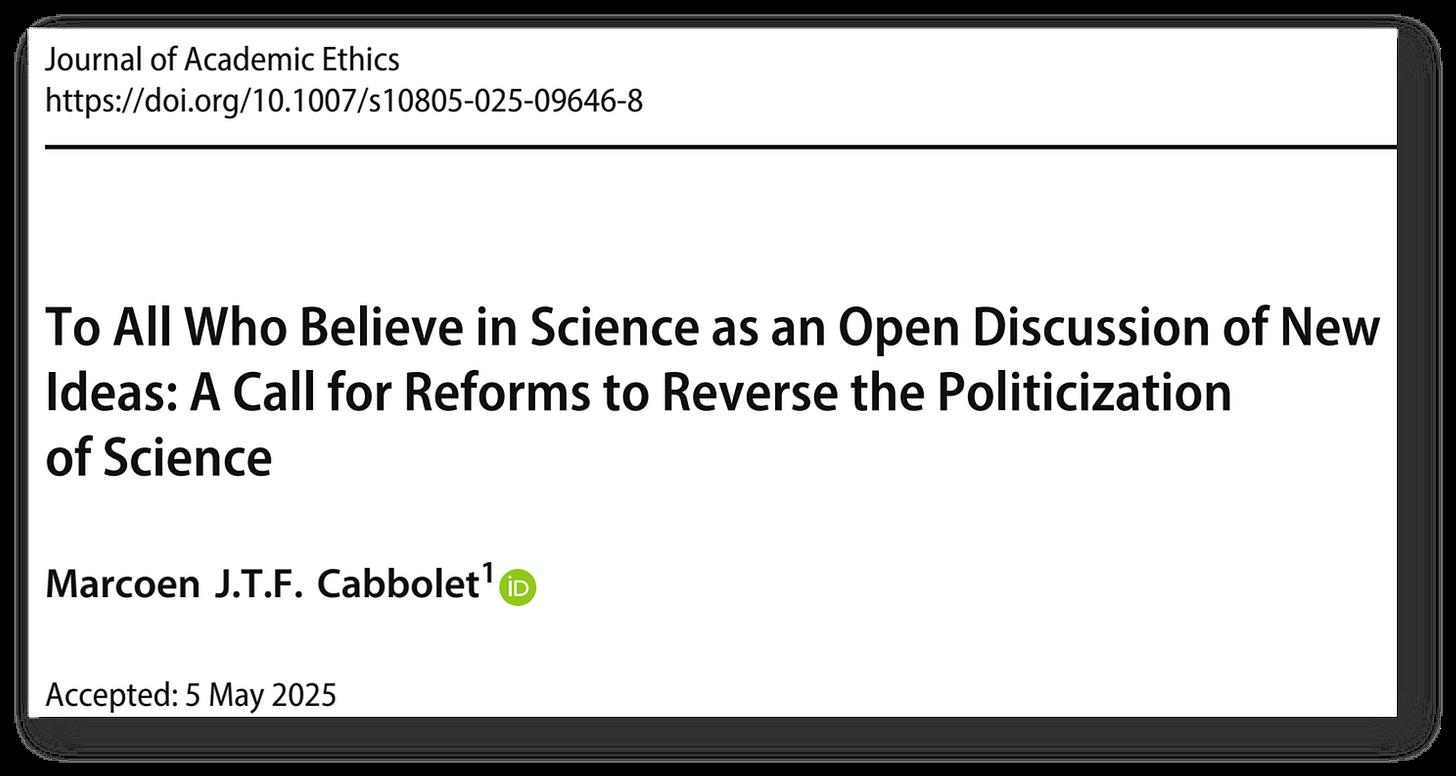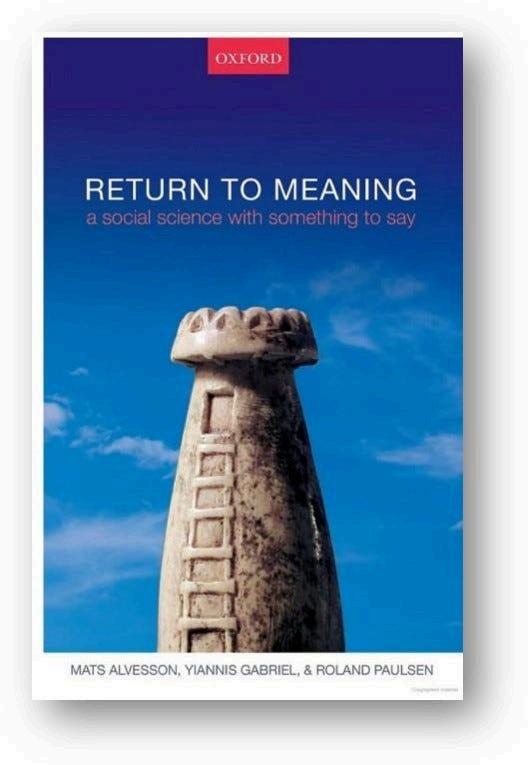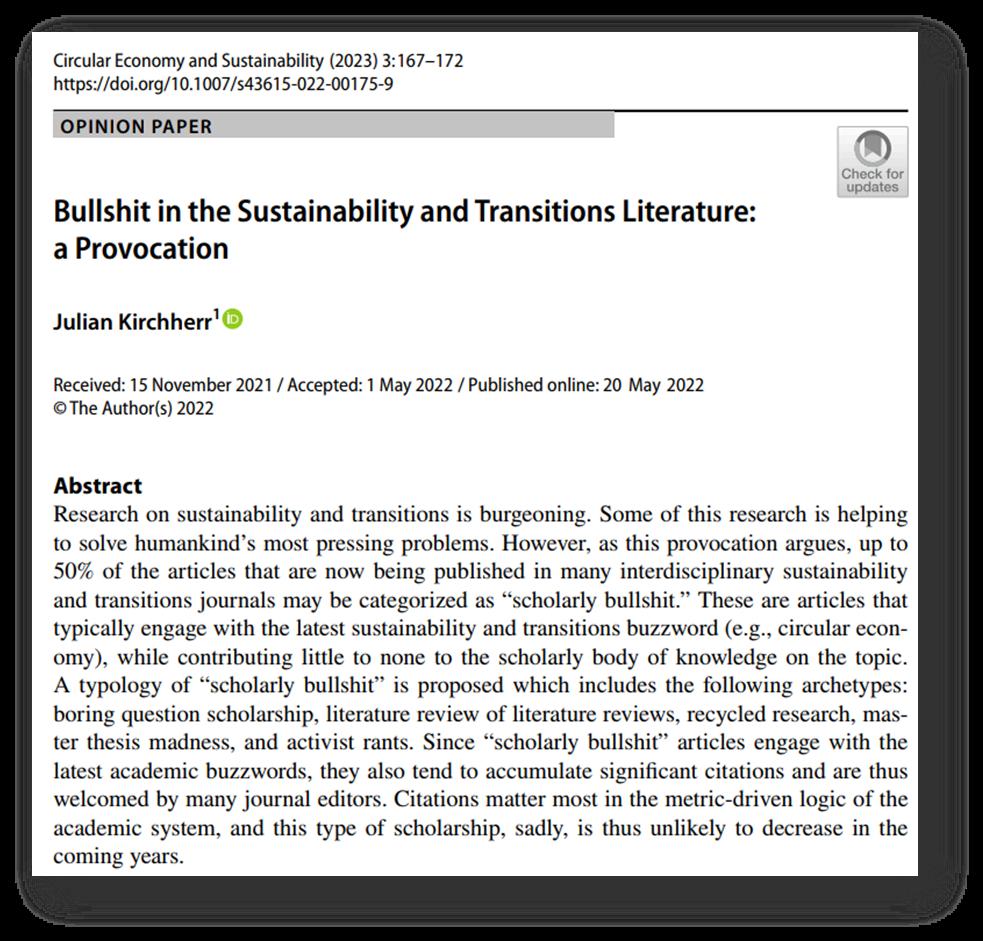Link:
https://climath.substack.com/p/science-as-an-open-discussion-of?utm so urce=post-email-title&publication id=2882758&post id=165985346&utm campaign=email-post-title&isFreemail=true&r=4uabj7&triedRedirect=tr ue&utm medium=email
Please see the link above for the source text.
Science as an open discussion of new ideas
And sophistry as the practice of making money from apparent but unreal wisdom
Demetris Koutsoyiannis
July 26, 2025
[There is a Greek version of this post Υπάρχει
The title of this post is borrowed from Marcoen Cabbolet’s recent paper:1

Its abstract is the following, but I warmly recommend reading the entire paper.
Abstract Science seems to be flourishing like never before. However, science has become politicized up to the point where it has become the rule rather than the exception that dissenting submissions i.e. manuscripts submitted for publication and research proposals submitted for funding that are critical of an accepted view or that propose a new view are rejected by pseudoskeptical review, which is distinctly unethical. As this is detrimental not only to the career perspectives of those who dare to question the mainstream but also to the development of knowledge, in this opinion piece, we call for reforms in science to the benefit of all.
As seen in the abstract, the author focuses on the notions of pseudoskepticism and, especially, pseudoskeptical reviews, which are clarified in the following quotations from the same paper:
So, what is wrong with this politicization of science is that by now it has become the norm for a dissenting submission i.e. a manuscript submitted for publication or a research proposal submitted for funding that is either critical of an accepted view or that introduces a new theory c.q. model that rejection is recommended by a pseudoskeptical review, that is, a review by a journal editor or a referee in which negative claims are made about the submission without satisfying the burden of proof that these claims require.
The first effective weapon against pseudoskepticism in editorial and peer review is scientific quality. […] [A] pseudoskeptical peer review is one in which (often strongly worded) negative allegations are made about someone else’s work, but which is itself of insufficient quality.
The second effective weapon against pseudoskepticism is the truth, because pseudoskeptics cannot handle the truth. They can be excellent experts, but the truth is that pseudoskeptics have violated these basic principles of good scientific practice—something that they’ll never admit. They have handled a dissenting submission not by evaluating its scientific quality or its potential for the field, but by dismissing it while affected by emotions caused by the realization that it contradicts their own core beliefs. That’s not science: that’s politics.
Cabbolet uses several examples to substantiate his claims. Among these, one refers to our paper, Koutsoyiannis and Kundzewicz (2020a):2
Example Demetris Koutsoyiannis and Zbigniew Kundzewicz published an unorthodox paper in Sci, in which they show that a new analysis of available data on global temperature and global CO2 concentrations yields support for the conclusion that changes in global CO2 concentration follow changes in global temperature (2020a) this goes squarely against the accepted narrative that changes in global temperature are caused by changes in global CO2 concentration. Prior to publication in Sci, the paper had been rejected by Science of the Total Environment for the stated reason that “The authors ... are not familiar with scientific concepts of causality. Proven rigorous methods for calculating causality ... do exist and should be applied. ... Applying [such a proven method] ... completely invalidates all the claims the authors do.” Koutsoyiannis and Kundzewicz (2020b)3 . This insisting on using only those methods for data analysis that support the accepted narrative is a violation of impartiality, hence pseudoskepticism; the referee report exhibits a telltale sign (1)4 . The authors, who allegedly knew nothing about causality, went on to publish two papers on the topic in Proceedings of the Royal Society A, presenting a new method for identifying causality (Koutsoyiannis et al., 2022a, b).5
I am glad that the case of blocking our paper in Science of the Total Environment served as a good example for Cabbolet’s paper. But I am not sure if the term pseudoskepticism he uses is well understood by the readers, or even if it is accurate. To me, it seems too diplomatic a term for such bad practices as blocking, banning, censoring, and silencing voices that do not conform to established political objectives. Yet some of the latter terms appear in Cabbolet’s paper, such as in the following quotations from the paper (where I have put emphasis in the terms in question):
But that politicization can only thrive in an environment where editorial and peer review can easily and with impunity be abused to block research on dissenting views from getting published or funded.
The erosion of ethical standards may also be apparent from the public call for abuse of peer review to block publication of ground-breaking work by the then-president [1986] of the American Physical Society (APS), one of the world’s largest associations of physicists, in Physics Today, the world’s most influential physics magazine.
The privately run arXiv.org is a preprint repository that differs from peer-reviewed journals, yet it has become the single most important venue for disseminating research results in physics and mathematics. Having started in the early 1990s, initially everyone could upload a preprint to arXiv.org. However, in the early 2000s a system of moderation was introduced: a select group of anonymous moderators now forms a central censorship committee, in that the moderators (i) limit the ideas that people are allowed to express on arXiv.org, and (ii) have the authority to prevent documents from being made available to the public on arXiv.org when they go against mainstream thought. A famous case is when the Nobel laureate Brian Josephson was banned from uploading to arXiv.org (2004).6
[T]he deterioration of the impartial quality assessment in research is a development away from an open discussion of new ideas as the Nobel-laureate Schwinger warned, “the replacement of impartial reviewing by censorship will be the end of science” (1991)7—and now is the time to address the issue. With reforms in science, we can reverse this politicization in science by reducing pseudoscepticism in editorial and peer review and dealing with the remaining cases.
I wish to offer a couple of comments inspired by this paper. First, I agree with the first sentence of the abstract, “Science seems to be flourishing like never before”. But I would stress the word “ seems ” (here I’ve put emphasis on it), and I would clarify that science is not flourishing in reality. Proliferation of funded projects and published papers does not reflect a flourishing science. Quite the opposite, as explained in Alvesson’s et al. (2017) book:8

The authors of this book find the proliferation of nonsense in academic research:
We argue that we are currently witnessing not merely a decline in the quality of scientific research, but a proliferation of meaningless research of no value to society and of only modest value to its authors apart from in the context of securing employment and promotion. […] Publishing comes to be seen as a game of hit and miss, of targets and rankings, crucial for the fashioning of academic careers and institutional prestige but devoid of intrinsic meaning and value, and of no wider social uses whatsoever. This is what we view as the rise of nonsense in academic research.
My hypothesis is that these developments are deliberate, which is supported by the fact that research proposals in Western countries are only funded if they conform to the dominant politico-ideological narrative. In turn, published research results tend to conform to the narrative. The final outcome is that we have sustainability in bullshit (and vice versa):9

Second, a politicized science is no longer science something that is not made clear in Cabbolet’s paper. It is sophistry, and it is known since the birth of science in the 6th century BC (or soon after). Specifically, Aristotle distinguished science, that is, the pursuit of the truth and in-depth knowledge that we seek for the satisfaction it causes per se, from sophistry, that is, the abuse of logic by trading in apparent (non-real) knowledge:
(Sophistry is the semblance of wisdom without the reality, and the sophist is one who makes money from apparent but unreal wisdom; On Sophistical Refutations, 165a21).
Socrates, as quoted by Xenophon, went one step further:
(Those who offer wisdom to all comers for money are known as sophists, just like prostitutes; Memorabilia, 1.6.13).
Apparently, such practices as rewarding of conforming ideas, censoring dissenting views, corrupting professional groups, and turning them into prostitutes extend beyond science. And it is a symptom of a declining society, a symptom with ever-growing severity because of its positive feedback. As put by Glenn Diesen, “Our culture of censorship and cancellation has made us blind, deaf, and dumb.”10 In my opinion, societies that are blind, deaf, and dumb are the pursuit of controligarchic “elites” of the Western world. These “elites” do not understand that this is an infectious disease that infects them too, making them blind, deaf, and dumb.
Can the vicious cycle be broken and the situation reversed? If so, how? I doubt Cabbolet’s call for reforms to reverse the politicization of science will be effective. I believe the problem is much more severe, and we need a new Enlightenment: an intellectual and ethical movement. We need a critical mass of competent and brave intellectuals who can provide an in-depth critique of the current social, political, and economic systems ones that differ substantially from those studied by Rousseau and Marx, for example. At the same time, we need to reestablish classical intellectual and ethical
values in our educational system. This would take decades, if attempted at all…
Thanks for reading Climath! Subscribe for free to receive new posts and support my work.
1
Cabbolet, M.J.T.F., 2025. To all who believe in science as an open discussion of new ideas: a call for reforms to reverse the politicization of science. Journal of Academic Ethics, https://doi.org/10.1007/s10805-025-09646-8. Also available at ResearchGate.
2
Koutsoyiannis, D., and Kundzewicz, Z.W., 2020a. Atmospheric temperature and CO2: Hen-or-egg causality? Sci, 2 (4), 83.
3
Koutsoyiannis, D., and Kundzewicz, Z.W., 2020b. Hen-or-egg causality: Atmospheric CO2 and temperature: Rejection by “Science of the Total Environment”. ResearchGate.
4
According to Cabbolet, the telltale sign (1) is the ad hominem argumentation, explained as “ a violation of impartiality, because ad hominem remarks are never given with the scientific interest in mind”.
Koutsoyiannis, D., Onof, C., Christofides, A. and Kundzewicz, Z.W., 2022a. Revisiting causality using stochastics: 1. Theory. Proceedings of The Royal Society A, 478 (2261), 20210835. Also available at ResearchGate.
Koutsoyiannis, D., Onof, C., Christofides, A. and Kundzewicz, Z.W., 2022b. Revisiting causality using stochastics: 2. Applications. Proceedings of the Royal Society A, 478 (2261), 20210836. Also available at ResearchGate.
6
Josephson, B.D., 2004. Covert censorship by the physics preprint archive. A personal perspective from Brian Josephson. Blog post.
7
Schwinger, J., 1991. Cold fusion does it have a future? In M. Suzuki & R. Kubo (Eds.), Evolutionary Trends in the Physical Sciences, Springer Proceedings in Physics, 57, 171–175. Springer.
8
Alvesson, M., Gabriel, Y. and Paulsen, R., 2017. Return To Meaning: A Social Science With Something To Say. Oxford University Press.
9
Kirchherr, J., 2023. Bullshit in the sustainability and transitions literature: a provocation. Circular Economy and Sustainability, 3 (1), 167-172.
10
Glenn Diesen, 2025. Iran's retaliatory strikes are more powerful than expected. X post
